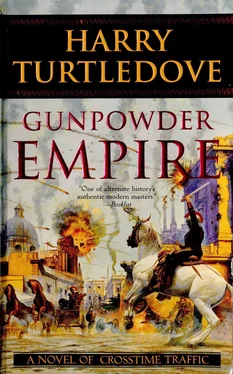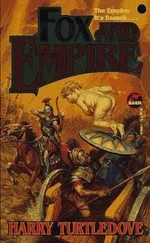Harry Turtledove - Gunpowder Empire
Здесь есть возможность читать онлайн «Harry Turtledove - Gunpowder Empire» весь текст электронной книги совершенно бесплатно (целиком полную версию без сокращений). В некоторых случаях можно слушать аудио, скачать через торрент в формате fb2 и присутствует краткое содержание. Жанр: Фантастика и фэнтези, на английском языке. Описание произведения, (предисловие) а так же отзывы посетителей доступны на портале библиотеки ЛибКат.
- Название:Gunpowder Empire
- Автор:
- Жанр:
- Год:неизвестен
- ISBN:нет данных
- Рейтинг книги:5 / 5. Голосов: 1
-
Избранное:Добавить в избранное
- Отзывы:
-
Ваша оценка:
- 100
- 1
- 2
- 3
- 4
- 5
Gunpowder Empire: краткое содержание, описание и аннотация
Предлагаем к чтению аннотацию, описание, краткое содержание или предисловие (зависит от того, что написал сам автор книги «Gunpowder Empire»). Если вы не нашли необходимую информацию о книге — напишите в комментариях, мы постараемся отыскать её.
Gunpowder Empire — читать онлайн бесплатно полную книгу (весь текст) целиком
Ниже представлен текст книги, разбитый по страницам. Система сохранения места последней прочитанной страницы, позволяет с удобством читать онлайн бесплатно книгу «Gunpowder Empire», без необходимости каждый раз заново искать на чём Вы остановились. Поставьте закладку, и сможете в любой момент перейти на страницу, на которой закончили чтение.
Интервал:
Закладка:
“We're Imperial Christians,” Dad said. “We're peaceful people. We don't cause trouble.”
Another grunt. “Yeah, that's what they all say.” The sergeant wrote it down, though. “Now-your home province and birthplace?”
It went on and on. Agrippan Rome floated on a sea of parchment, papyrus, and, in recent years, paper. The Empire had been a going concern for more than two thousand years. Amanda wondered if anyone had ever thrown anything out in all that time. Somewhere in Polisso, were there records of travelers who'd come through this gate five hundred or a thousand or fifteen hundred years before? She wouldn't have been surprised. Had anybody looked at them since a bored guard took them down? That would have surprised her.
After what seemed like forever and was almost half an hour, the sergeant said, “All right. Everything seems in order. Entry tax for a grade-three town, a family of four, merchant class, is… Let me see.” He had to check a sheet of parchment nailed to the guardhouse wall. Once he had checked it, he did some figuring on his fingers. “Eighteen denari.”
Dad grumbled. Grumbling was good form. It said you weren't too rich to worry about money. Grumble a lot, though, and you risked annoying the guardsmen. “Here.” Dad handed over the small silver coins. They weren't all quite the same size or shape, but they all weighed the same. The Empire was careful about its coinage.
The sergeant counted the denari. Twice. Then he nodded. “You have paid the entry tax,” he said formally. “You do not have the seeming of Lietuvan spies. Enter, therefore, into the city of Polisso. May your dealings be profitable. You will report to the temple of the spirit of the Emperor for the required sacrifice. If not, your failure will be noted.” He sent Dad a hard look.
In this paperwork-mad society, not sacrificing would be noticed. But Dad only said, “We will. I told you, we're Imperial Christians.”
Christianity here had the same name as it did back home, but it wasn't the same thing. In this world, it never had become the most important faith in the Roman Empire. The Empire here hadn't gone through the troubles it had in Amanda's world. It had stayed strong and mostly prosperous. People hadn't worried so much about the next world. For most of them, this one had seemed enough. The new belief and the old ones had mingled much more here. Even the Christians who didn't call themselves Imperial were less strict about other gods than the ones in the home timeline.
Judaism here wasn't as different as Christianity, but it wasn't the same, either. Jews here didn't believe the Emperor was divine, the way most people did. But they did think of him as God's viceroy on earth. They would sacrifice to his good health and good fortune, but not to his spirit.
In this world, Muhammad had never been born. It was a different place, with a different history. Finding things in it the same as they were back home would have been the real shocker.
“Come on,” Jeremy said. “Let's get moving.”
“Why are you in such a hurry?” Mom asked. He didn't answer, but pushed on into Polisso. The rest of the family followed.
Once upon a time, the town had been a camp where a Roman legion stayed. It still kept the square layout and grid of main streets it had had then. In between those streets that joined at neat right angles, little lanes and alleys wandered every which way. Houses had their lower story of stone or brick, the upper floors of timber. Some of them had balconies that reached across the lanes toward balconies reaching from the other side. Amanda wondered how sunlight ever trickled down there. By the damp, nasty smell, it often didn't.
A triumphal arch sprouted in the middle of a square. Men on horseback, ox carts, and people on foot went past it or under it. They didn't look at it twice. Why should they? To them, it was just part of the landscape. Amanda pointed to the figure in relief above the keystone. 'There's Agrippa.“
Even after almost two thousand years of weathering, even with bird droppings streaking his face and his ceremonial armor, Marcus Vipsanius Agrippa still looked tough. The sculptor showed him as a burly, muscular man with bushy eyebrows, a big nose, and a chin that stuck out. Here, as in Amanda's world, he'd been a lifelong friend and helper to Augustus, the first Roman Emperor. In both worlds, Augustus had married his daughter to Agrippa. He'd given Agrippa his ring during an illness, showing he wanted Agrippa to be his heir.
Augustus was always getting sick-and always getting better. Agrippa was the picture of health-till, in Amanda's world, he died in 12 B.C. He was only fifty-one. Augustus kept right on getting sick-and getting better-for another quarter of a century before he finally died, too.
In this world, Agrippa had stayed healthy. It made an enormous difference. Augustus tried to conquer Germania, the way his great-uncle, Julius Caesar, had conquered Gallia. When the Germans rebelled, in Amanda's world Augustus had had to send a bad general against them. Agrippa was already more than twenty years dead. The other general-his name was Varus-got three Roman legions massacred. The German revolt succeeded. In Amanda's world, the Roman frontier stopped at the Rhine till the Empire fell.
Things weren't the same in this world. Here, Augustus had had Agrippa to use against the Germans. Agrippa was old by then-he was the same age as Augustus-but he knew his business. He beat the Germans and killed their chief. Settlers from the Empire came in, as they had in Gallia. Germania became a Roman province. Here, it still was a Roman province.
And when Augustus finally died here, who succeeded him? Agrippa. “My hair is white, but I am still strong,” he said when he became Emperor. He proved it, too. He reigned for twelve years on his own, and he conquered Dacia-the land that had become Romania in Amanda's world. The Romans had conquered it in her world, too, but not for almost another hundred years. They'd never held it very firmly there. Here, it was still called Dacia, and it still belonged to Rome.
One man, Amanda thought, looking up at Agrippa. One man made all that difference. In her world, the German invasions helped bring down the Roman Empire. In this one, the people of Germania became Romanized. They came to speak and read and write Latin. Cities sprang up there, Roman cities. Some great Roman Emperors and some great scholars and writers-and a lot of good soldiers-here had had German blood. The same held true for Dacia, though not quite to the same degree.
With the lands and people it hadn't had in her world, the Roman Empire here never fell. It went on and on, staying itself and not changing much, the way China had in her world. It had known a couple of dynasties of nomad conquerors from off the steppe, but in time it had swallowed them up. They were like a drop of ink in a lake. They couldn't turn all that water black. There weren't enough of them.
Dad pointed to a sign. LUCERNARIUS, it said: lamp-seller. Sure enough, the little shop stocked lamps of pottery and polished brass. “There's a man trying to rise above his place here,” Dad remarked.
“How come?” Amanda said, and then, “Oh! The sign's in classical Latin.”
“You bet it is,” Dad said. “In neoLatin, it'd just be lucerno.“
The sounds of neoLatin had changed less from the old language than those of Italian or Spanish or French. But its grammar worked like theirs-and like English's, too, come to that. Word order told who did what in a sentence. Man bites dog meant something different from Dog bites man.
Classical Latin had another way of doing things. You could use almost any word order you wanted, because word endings were what counted. If a lamp-seller bit a dog, he was a lucernarius. If the dog bit him, he was a lucernarium. If you gave him a dog, you gave it to a lucernario. After that, it was his dog, canis lucernarii-or, if you preferred, lucernarii canis. And if you wanted to speak to him about it, you called out, Lucernarie! All nouns changed like that. Adjectives changed with them. Verbs had their own forms.
Читать дальшеИнтервал:
Закладка:
Похожие книги на «Gunpowder Empire»
Представляем Вашему вниманию похожие книги на «Gunpowder Empire» списком для выбора. Мы отобрали схожую по названию и смыслу литературу в надежде предоставить читателям больше вариантов отыскать новые, интересные, ещё непрочитанные произведения.
Обсуждение, отзывы о книге «Gunpowder Empire» и просто собственные мнения читателей. Оставьте ваши комментарии, напишите, что Вы думаете о произведении, его смысле или главных героях. Укажите что конкретно понравилось, а что нет, и почему Вы так считаете.












